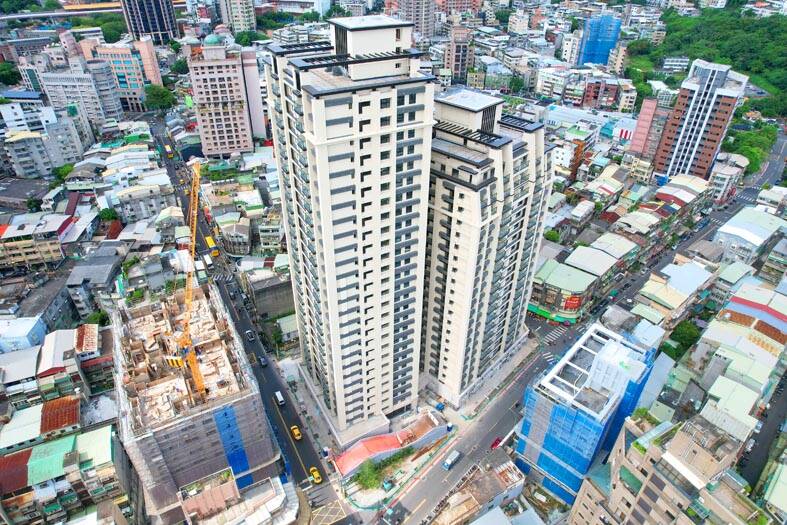The nation’s five major state-run banks extended NT$121.739 billion (US$3.80 billion) in new mortgages last month, the highest amount on record and surpassing the NT$100 billion mark for the third consecutive month, central bank data released yesterday showed.
Total new mortgages extended by the Bank of Taiwan (臺灣銀行), Land Bank of Taiwan (土地銀行), Taiwan Cooperative Bank (合作金庫銀行), Hua Nan Commercial Bank (華南銀行) and First Commercial Bank (第一銀行) last month increased by NT$20.518 billion, or 20.27 percent, from NT$101.221 billion the previous month, central bank data showed.
The monthly increase in new mortgages came as most home buyers tend to strike deals ahead of Ghost Month on the lunar calendar, which began on Aug. 4, resulting in a significant increase in property transactions and housing loans last month, the central bank said.

Photo: CNA
Housing transactions in the six special municipalities last month totaled 26,555 units, a 33.6 percent increase from a year earlier and marking the highest July figure since 2014, data released by local governments earlier this month showed.
In addition, the average mortgage rate charged by the five state-run banks rose 0.003 basis points to 2.187 percent last month from 2.184 percent the previous month, mainly because some banks raised rates for non-first-time home buyers, the central bank said.
The data also showed that preferential loans for first-home buyers under a government program contributed 38.23 percent of the total new mortgages last month, down 2.69 basis points from the previous month, despite that the amount increased from NT$41.42 billion to NT$46.54 billion.
The program has more flexible conditions for loan applications, offers favorable lending terms and sets a lower barrier for young people than a previous similar scheme.
However, it has also drawn wide criticism for rekindling a hot housing market in Taiwan this year.
During the first seven months of this year, the five state-run banks extended NT$672.99 billion of new mortgages, a record for the period and up 84.34 percent from NT$365.08 billion a year earlier, the data showed.
The latest data came after the central bank on Wednesday announced that domestic lenders must come up with self-disciplinary measures by Sept. 6 to limit mortgage operations and prevent an overconcentration of real-estate loans.
It is part of the monetary policymaker’s efforts to cool the housing market after it introduced a new round of credit-control measures last month, as well as hiked lenders’ required reserve ratio by 25 basis points and tightened second-home mortgage terms in June.
Meanwhile, the Ministry of Finance and state-run lenders have also taken actions recently to crack down on abuses of the favorable loan terms intended for first-time home buyers and self-occupancy.

Sweeping policy changes under US Secretary of Health and Human Services Robert F. Kennedy Jr are having a chilling effect on vaccine makers as anti-vaccine rhetoric has turned into concrete changes in inoculation schedules and recommendations, investors and executives said. The administration of US President Donald Trump has in the past year upended vaccine recommendations, with the country last month ending its longstanding guidance that all children receive inoculations against flu, hepatitis A and other diseases. The unprecedented changes have led to diminished vaccine usage, hurt the investment case for some biotechs, and created a drag that would likely dent revenues and

Global semiconductor stocks advanced yesterday, as comments by Nvidia Corp chief executive officer Jensen Huang (黃仁勳) at Davos, Switzerland, helped reinforce investor enthusiasm for artificial intelligence (AI). Samsung Electronics Co gained as much as 5 percent to an all-time high, helping drive South Korea’s benchmark KOSPI above 5,000 for the first time. That came after the Philadelphia Semiconductor Index rose more than 3 percent to a fresh record on Wednesday, with a boost from Nvidia. The gains came amid broad risk-on trade after US President Donald Trump withdrew his threat of tariffs on some European nations over backing for Greenland. Huang further

CULPRITS: Factors that affected the slip included falling global crude oil prices, wait-and-see consumer attitudes due to US tariffs and a different Lunar New Year holiday schedule Taiwan’s retail sales ended a nine-year growth streak last year, slipping 0.2 percent from a year earlier as uncertainty over US tariff policies affected demand for durable goods, data released on Friday by the Ministry of Economic Affairs showed. Last year’s retail sales totaled NT$4.84 trillion (US$153.27 billion), down about NT$9.5 billion, or 0.2 percent, from 2024. Despite the decline, the figure was still the second-highest annual sales total on record. Ministry statistics department deputy head Chen Yu-fang (陳玉芳) said sales of cars, motorcycles and related products, which accounted for 17.4 percent of total retail rales last year, fell NT$68.1 billion, or

HSBC Bank Taiwan Ltd (匯豐台灣商銀) and the Taiwan High Prosecutors Office recently signed a memorandum of understanding (MOU) to enhance cooperation on the suspicious transaction analysis mechanism. This landmark agreement makes HSBC the first foreign bank in Taiwan to establish such a partnership with the High Prosecutors Office, underscoring its commitment to active anti-fraud initiatives, financial inclusion, and the “Treating Customers Fairly” principle. Through this deep public-private collaboration, both parties aim to co-create a secure financial ecosystem via early warning detection and precise fraud prevention technologies. At the signing ceremony, HSBC Taiwan CEO and head of banking Adam Chen (陳志堅)